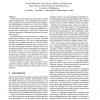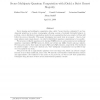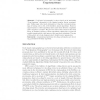36 search results - page 4 / 8 » Progress in Quantum Computational Cryptography |
FOCS
2009
IEEE
13 years 9 months ago
2009
IEEE
Coin flipping is a fundamental cryptographic primitive that enables two distrustful and far apart parties to create a uniformly random bit [Blu81]. Quantum information allows for ...
CORR
1999
Springer
13 years 5 months ago
1999
Springer
Quantum key distribution is the best known application of quantum cryptography. Previously proposed proofs of security of quantum key distribution contain various technical subtle...
ISCA
2005
IEEE
13 years 11 months ago
2005
IEEE
: The theoretical study of quantum computation has yielded efficient algorithms for some traditionally hard problems. Correspondingly, experimental work on the underlying physical...
FOCS
2006
IEEE
13 years 11 months ago
2006
IEEE
Secret sharing and multiparty computation (also called “secure function evaluation”) are fundamental primitives in modern cryptography, allowing a group of mutually distrustfu...
ASIACRYPT
2009
Springer
14 years 10 days ago
2009
Springer
Code-based cryptography is often viewed as an interesting “Post-Quantum” alternative to the classical number theory cryptography. Unlike many other such alternatives, it has th...



